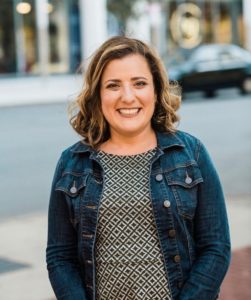Last week, while most of Washington, D.C. was shut down or blowing up over Pres. Trump’s appealing-to-his-base border wall, there was a relatively quiet indicator that, at least sometimes, the federal government might actually be looking out for the little guy. And it was, in no small part, thanks to the ongoing work of Temple sociologist Sara Goldrick-Rab.

For “the first time in the nation’s history,” as Goldrick-Rab put it later, federal officials acknowledged, during a briefing on a General Accounting Office report, that thousands of college students nationwide go literally hungry in their pursuit of an education. Goldrick-Rab, who co-chaired the briefing, was as blunt as ever about the effects of this hunger. “Food insecurity is a college-completion issue,” she said. “We’re undermining our federal investment in financial aid by not paying attention to this. We have to stop pretending like living expenses are not educational expenses.”
Goldrick-Rab, who Politico magazine in 2016 named one of the top 50 people shaping American politics, has spent years, first at the University of Wisconsin and now here, delving into the financial hardship of higher education in America—not just the rising tuition costs we all wring our hands about, but the other costs as well: Housing, food, transportation, books. In September, she launched the Hope Center for College Community and Justice at Temple, to meld research, policy recommendations and solutions for helping college students succeed.
I always tell people: If you don’t like the price of college, vote. You have to make this a voting issue, and you have to hold your representatives accountable for it.
At the same time, she issued a report that laid out the troubling statistics: Of students at Community College of Philadelphia, 56 percent reported being food and housing insecure, and 19 percent were homeless, slightly higher than national community college averages; at Temple, 35 percent were food insecure, 34 percent housing insecure and 7 percent homeless, about the same as national university stats.

On Wednesday, the Hope Center is hosting “Cash Rules Everything Around Me,” a town hall for students, parents and public officials about college costs and debt, with Seth Frotman, former student loan ombudsman for the Consumer Financial Protection Bureau; Councilwoman Helen Gym; State Rep. Malcolm Kenyatta; Economy League Executive Director Jeff Hornstein; and CCP student Michael Luna.
The Citizen talked to Goldrick-Rab the day after her D.C. appearance, about the issues she raised, and will raise on Wednesday.
RPS: You moved here in 2016 after a public tenure dispute with the University of Wisconsin. How is Temple a fitting place for your work?
SGR: I wanted to leave Wisconsin, but wouldn’t have unless I found a good fit. Philly is that fit. It has all the problems I’m interested in, at scale. It’s a town that’s willing to say what needs to be said, which is how I like to do business. And Temple is the right place for this work. I will only work in the public sector because it’s where the students who need me most are. Seventy-five percent of American college students go to public institutions.
Temple is living the real economics of education: Soaring prices, dropping financial support, very lean times with students, many of whom are experiencing hardships like homelessness. It’s selfish, in one way, because if I don’t walk my talk my work will suffer. But I also think I can do more good for the world standing up there at Temple than I can at someplace like Penn, where I got my PhD.
RPS: What is the purpose of Wednesday’s Town Hall?
SGR: I do a lot of work that relates to the issues that ordinary people have: College costs too much, living costs too much, they’re worried about debt. But they don’t always have a chance to connect to people on campuses who are working on it. I try to be public-facing. We are not approaching this in the mode of being experts, but in the mode of having a conversation.
![]()
We want to really drive home the consequences of student debt to every family. It sounds abstract unless you’re currently paying on it: It’s easy to say, I don’t have kids in college; I’m not paying off debt. What do I care? To me, the consumer consequences of debt are not the worst part. I don’t care as much that my neighbor can’t afford to buy a house. I’m much more worried that my neighbor feels negatively about education because of debt, that the parents of students my kids go to school with have negative impressions of education.
We’ve been in this virtuous cycle of education in this country—that it helps people get to a better place—and we’re at a point where that may be reversing. And it’s communities of color, who have fought the hardest for this, who are the ones being hit hardest by the student debt crisis.
RPS: You have done a lot of research on the high cost of a college education. Has the problem of campus hunger become worse, in line with rising tuition, for example?
SGR: It’s hard to know if the numbers have grown, because no one was tracking this before. I can say that the conditions that lead to this problem have gotten worse. It’s not just the high price; there is more access to college for low income people than ever. The people who qualified for free school lunch in the 1960s didn’t go to college; now they do. But we didn’t think about extending the free lunch program for those students.
Meanwhile, university budgets have gotten tighter: Temple has less money per student from the state, so will try to make up the money. One way to do that is through a food services contract. They get a good deal through Aramark, which lets them afford some things the university otherwise couldn’t afford. The meal plan prices are higher than they should be, but Temple will get a piece of that.
And I have a hard time criticizing Temple for it, because again, the university has less money than it needs. Pennsylvania is 48th in the country as far as college affordability. I came from Wisconsin, and it’s hard to believe it’s worse than under [former Gov.] Scott Walker.
RPS: That’s incredible. What does that mean?
SGR: I’m referring to the amount of money per student that the state takes from taxes and puts toward tuition at state universities. The cost to families is the difference between what an education costs, and what the state provides. That’s gotten worse over time. For example: If a student’s education at Temple costs $1, the state used to say, “We’ll put in 75 cents, you put in a quarter.” Now, they say, “We’ll put in 25 cents, and you put in the rest.” In other states, they put in more.
The people who qualified for free school lunch in the 1960s didn’t go to college; now they do. But we didn’t think about extending the free lunch program for those students.
And our financial aid is not generous: New York spends a lot of money offsetting the cost of college with financial aid. The students there struggle because of the high cost of living expenses, but they are getting generous student aid.
RPS: In your comments to some Congresspeople last week you talked about this issue of loans. What did you tell them?
![]()
SGR: 1, this is absolutely a problem affecting a lot of people. And 2, the government is undermining its own investment in financial aid, including loans, by not addressing hunger. If you give a student a Pell grant—which is running $30 billion a year; other loans are about $100 billion a year—and they still fall short of what they need to eat, they’re not going to do well in school. The fact that we don’t also connect low-income students to SNAP [Supplemental Nutrition Assistance Program], or the school lunch program, is inefficient.
They often will not be able to stay in school. And that is worse than not starting college at all. Debt with no degree is the absolute killer.
RPS: So what can be done about this?
SGR: That’s one of the things we’ll talk about at the Town Hall. In the first hour, we’ll size up who’s in the audience, do some interactive polling. In the second hour, there’s a q&a. I’m going to size up their opinions: How many people there think we should eliminate the debt that’s out there? There’s been a lot of call for debt relief. I don’t think it’s viable, but it’s helpful to know how people are leaning.
We’ve been in this virtuous cycle of education in this country, and we’re at a point where that may be reversing. And it’s communities of color, who have fought the hardest for this, who are the ones being hit hardest by the student debt crisis.
Or, should we be pushing to change the terms—lowering interest rates, renegotiating the payment terms. That’s something we can buttress some support for. The third idea out there is making college tuition free. There’s a campaign in the state for that. If people care about that, and they don’t like the debt, they need to act politically to support that.
I always tell people: If you don’t like the price of college, vote. You have to make this a voting issue, and you have to hold your representatives accountable for it. What are the marching orders for Kenyatta? What are they for Helen Gym? People have a say, and what we have right now are a lot of unhappy people who aren’t saying much.
![]()
We have people all over the region who are worried about the price of college, and are trying to decide what to do, what sort of 529 plan they should have, and what vacation they should defer. My point to them is: you can not save your way out of this. It will never be enough. The price is going up; financial aid is going down. If you want to do something, do it while your child is five. Take your political action now, and we can have a new system.
RPS: Do you have a template for what we should be looking for in a politician, or what we should demand from them?
SGR: Not yet. We are just getting started, and we don’t have a staff member for that right now. We will put it on our agenda in time for 2020, though.
I do know that it’s not a party thing: Democrats have disappointed me just as much as Republicans. I would like to see Mayor Kenney talking about higher ed more when he talks about education. There should be a strain that runs from preschool to college. Kids’ opportunities are shaped by what they think they get to do with their life. If they don’t think they’re going to college, they may not make the right choices in high school. I’d like City Council to be taking a broader view: Does the housing committee talk to the education committee? Shouldn’t they, if they want to address poverty? They work together.
RPS: You call your nonprofit the Hope Center. What gives you hope in this work?
SGR: People say to me that I always sound mad. And I am; I’m pissed. All of Philly should be mad, and I have yet to meet someone who doesn’t know what I’m talking about. This is a bad situation impacting some good people.
One of the reasons I call out the word “hope” is that there is substantial literature out there that optimism pays off. Hope is a strategy, not a fuzzy cloud. And the students give us hope. I have spent so many hours sitting across from someone who is homeless and going to college. They are amazing. I can’t believe the lengths they will go to to get an education because they really understand how that will impact their future. You can’t see such resilience in people and not feel hopeful about it.
Wednesday, January 16, 6pm-9pm, Free, Temple Performing Arts Center, 1837 N. Broad Street.
Photo via Wikimedia Commons






